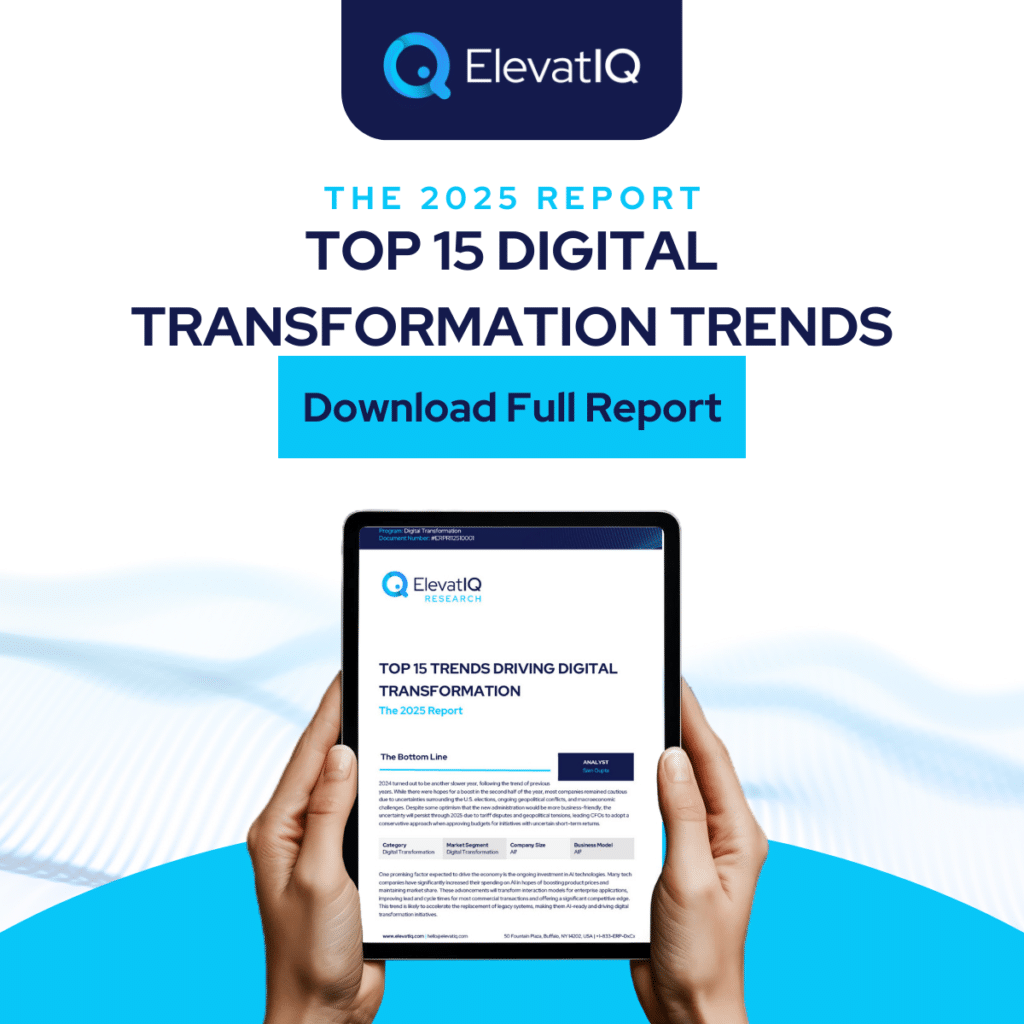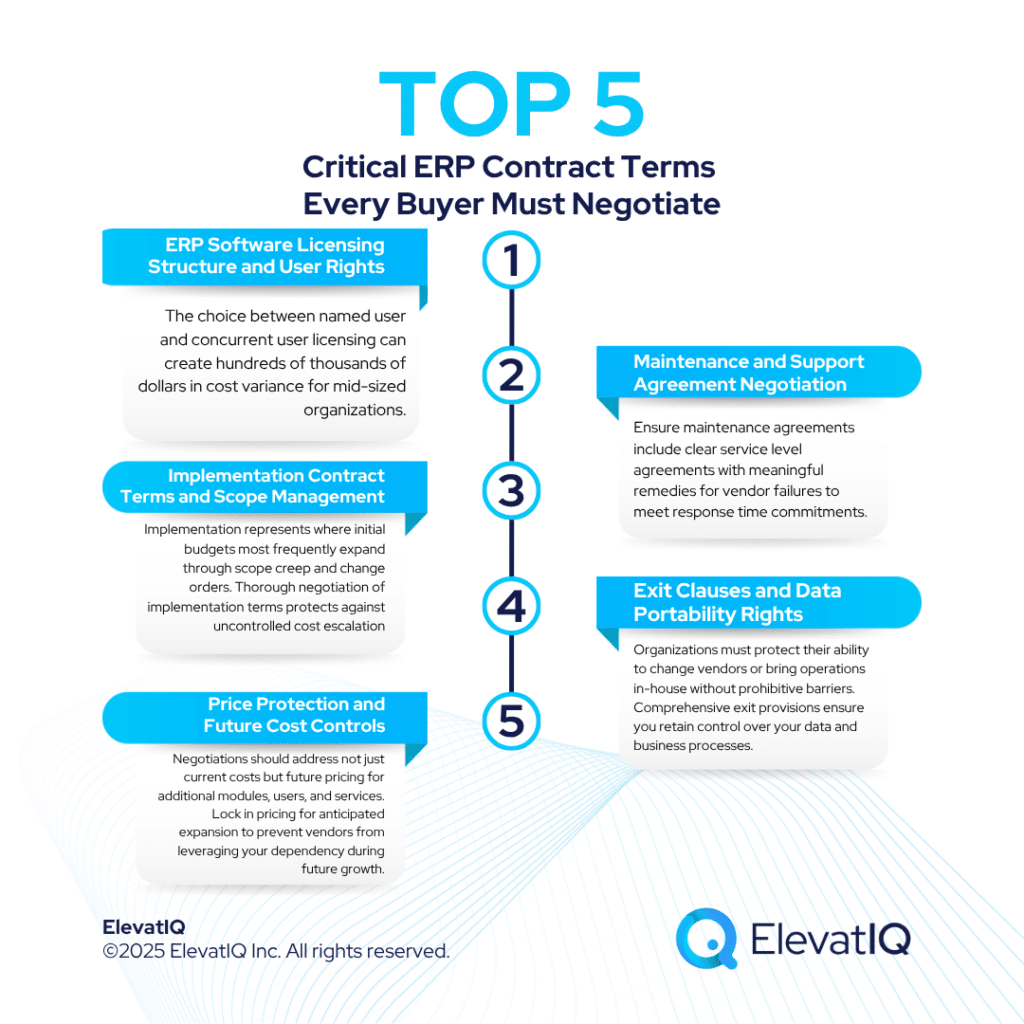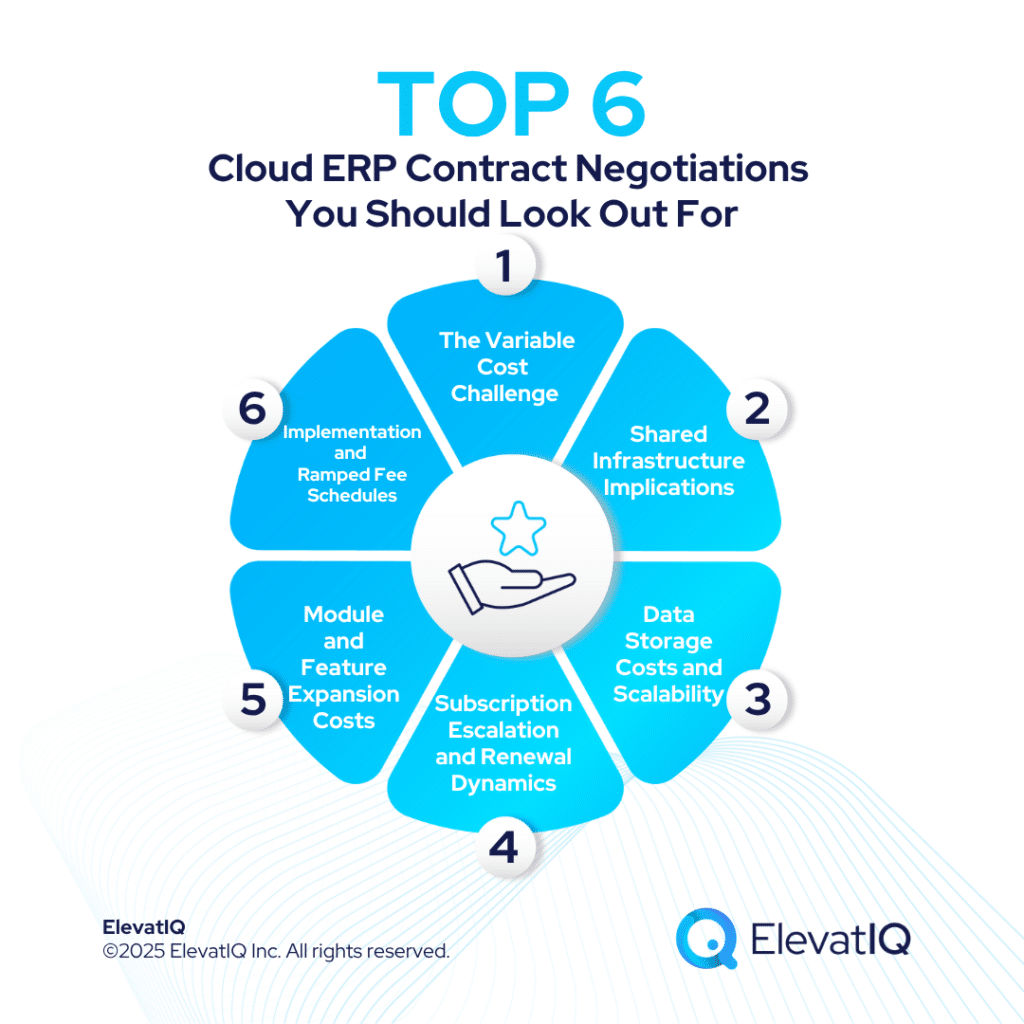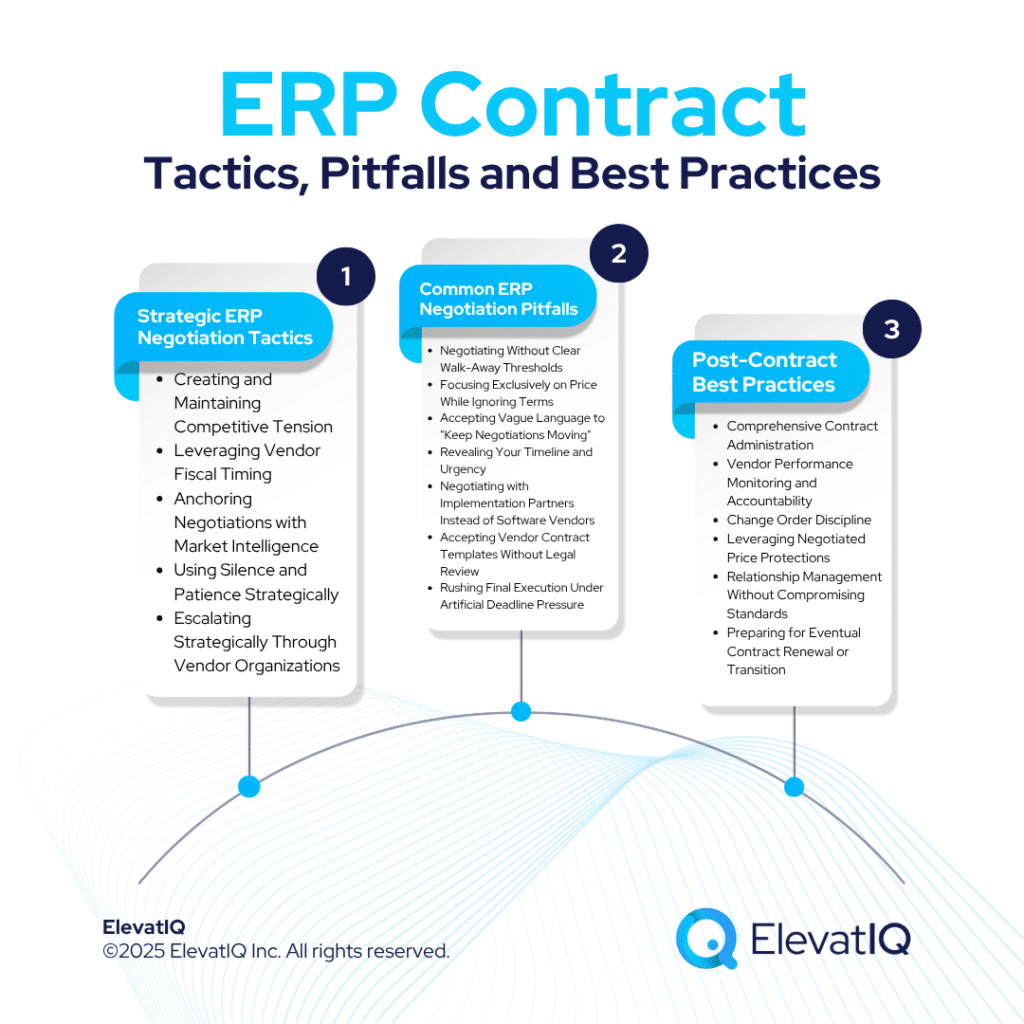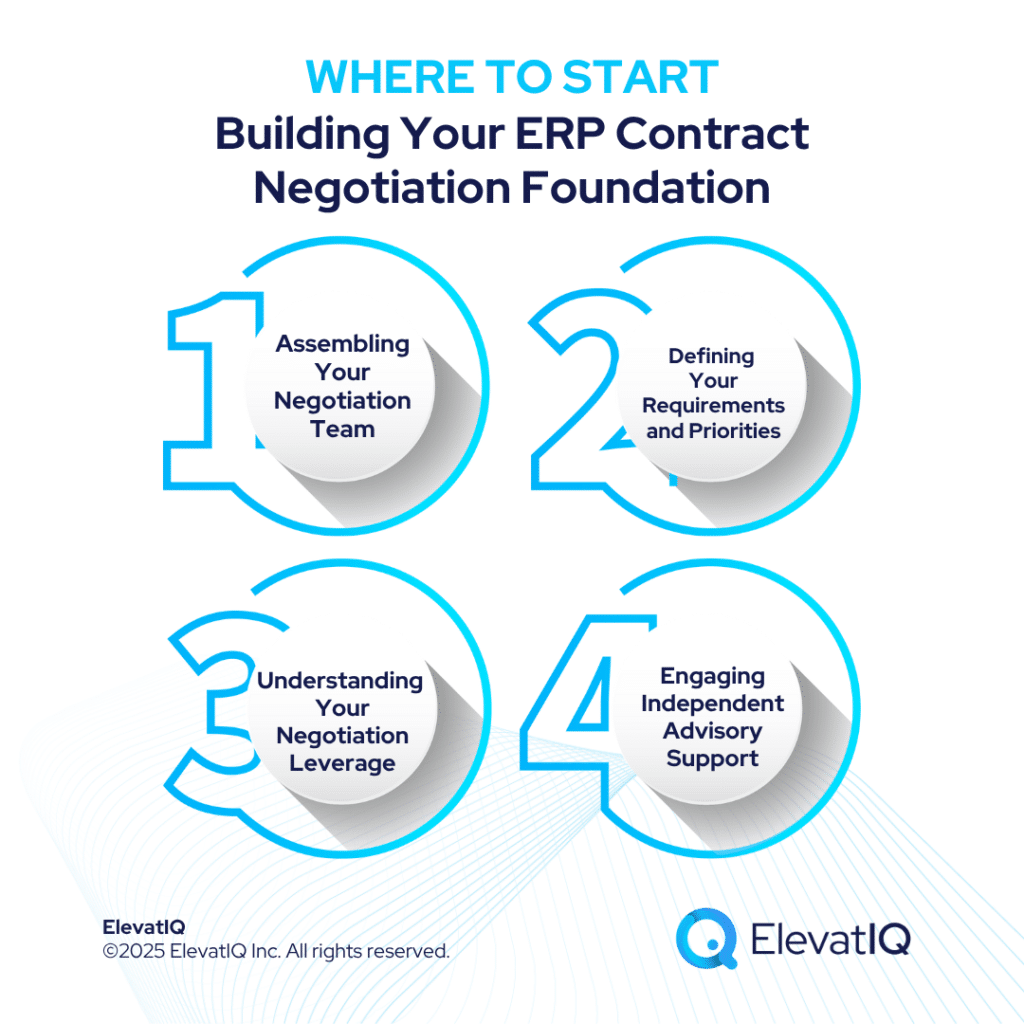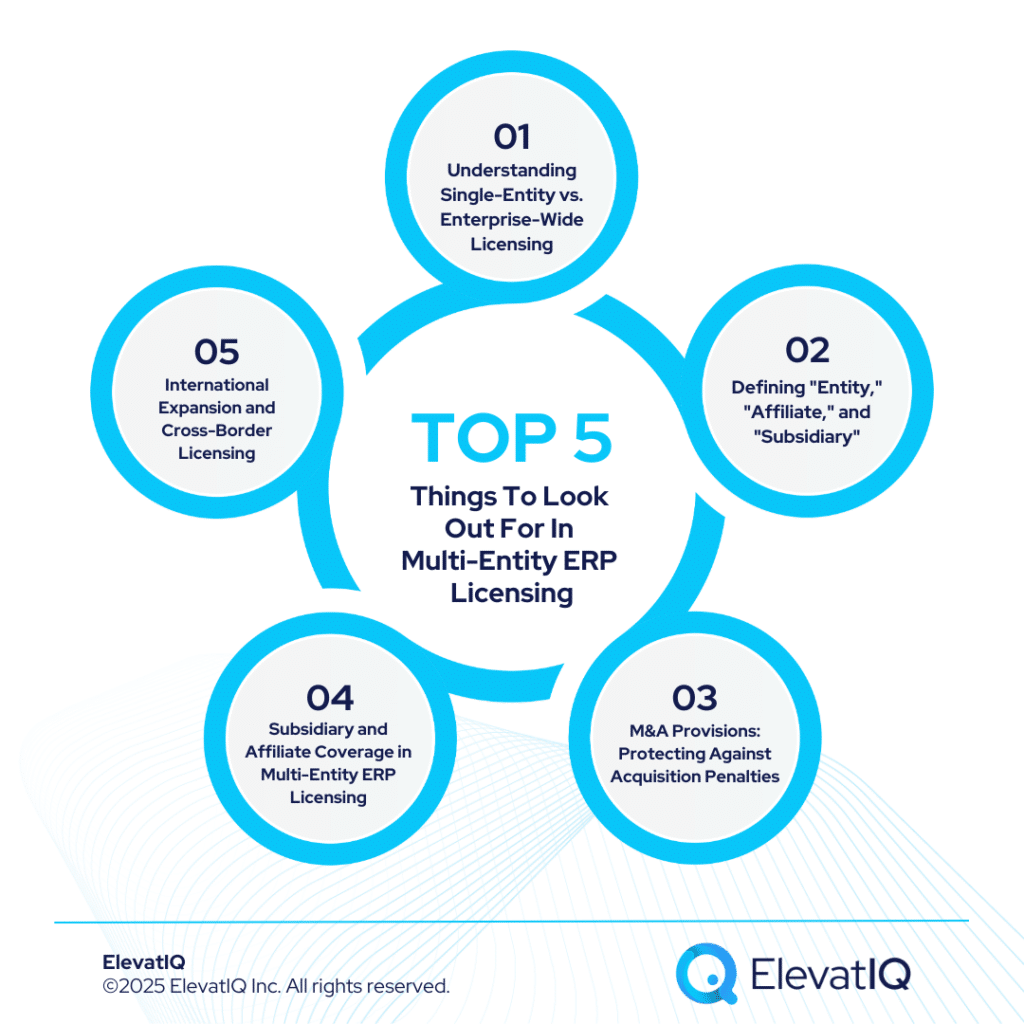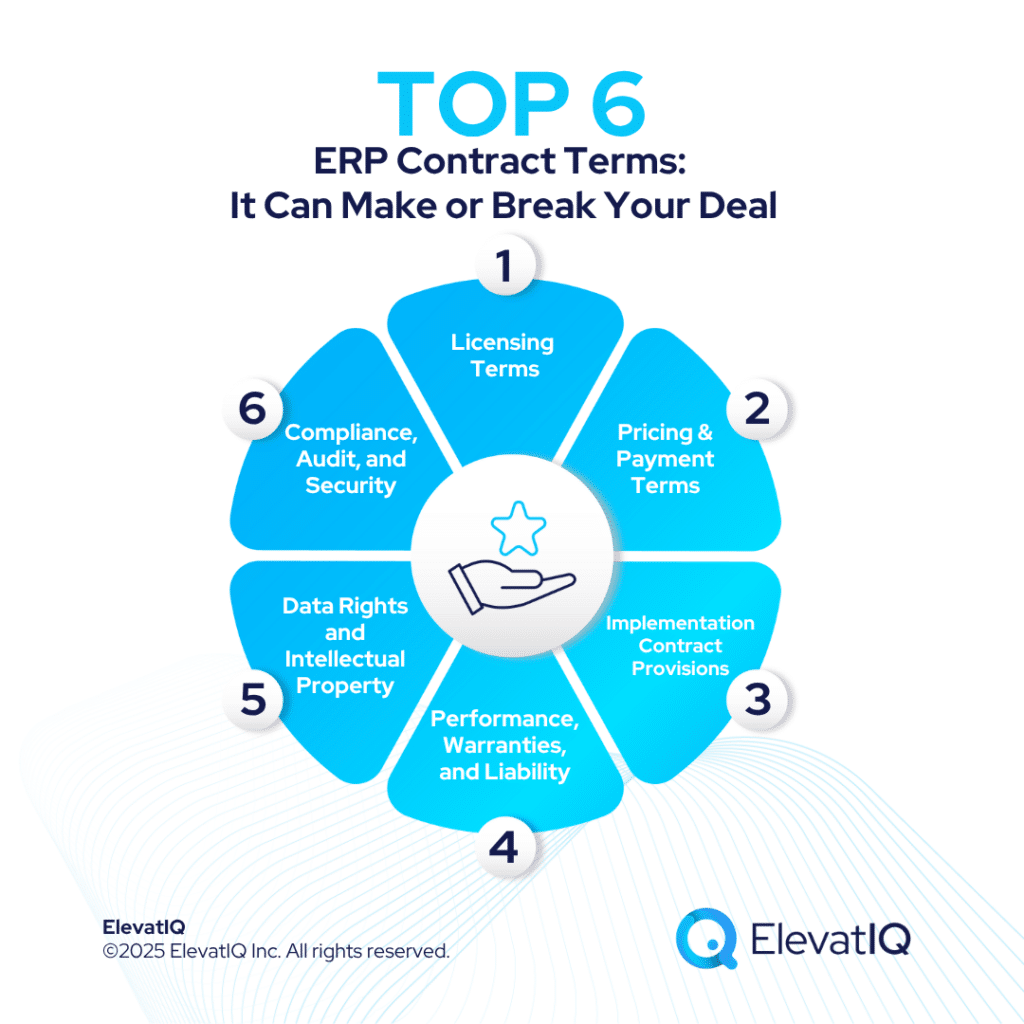Last Updated on January 2, 2026 by Sam Gupta
Enterprise resource planning implementations represent some of the largest technology investments organizations make, often reaching millions of dollars over the contract lifecycle. Yet many buyers approach ERP contract negotiations without recognizing the significant leverage they hold or understanding the terms that will impact their organizations for years to come.
Standard vendor contracts heavily favor the seller, embedding escalation clauses, restrictive licensing terms, and vague service commitments that can dramatically inflate costs over time. The difference between accepting initial terms and conducting strategic ERP contract negotiation can save organizations 20-40% on total contract value while securing more favorable operational terms. This article provides ERP buyers with proven negotiation strategies, critical contract terms that demand attention, and timing tactics that maximize leverage throughout the procurement process.
Understanding ERP Vendor Negotiation Dynamics
Successful ERP contract negotiations begin with understanding your vendor’s position and motivations. Enterprise software vendors operate under intense revenue recognition pressures, with sales teams measured quarterly on bookings and annual recurring revenue growth.
How Vendor Sales Cycles Create Negotiation Opportunities
Sales representatives face escalating pressure as fiscal quarters and years approach their end. This cyclical dynamic creates natural negotiation windows where vendors become significantly more flexible on pricing, terms, and concessions. Organizations that time their procurement processes to align with these pressure points consistently achieve better outcomes.
The Reality Behind ERP Software Pricing
The gap between list prices and actual market rates in enterprise software often exceeds 40-60%. Initial proposals rarely represent the vendor’s true walk-away price. Vendors build substantial margin into opening offers, expecting sophisticated buyers to negotiate aggressively. Organizations that accept initial pricing without thorough negotiation effectively subsidize discounts other customers receive.
Understanding market pricing requires either extensive procurement experience or engagement with independent advisors who maintain visibility across multiple negotiations and can benchmark proposed terms against actual market rates.
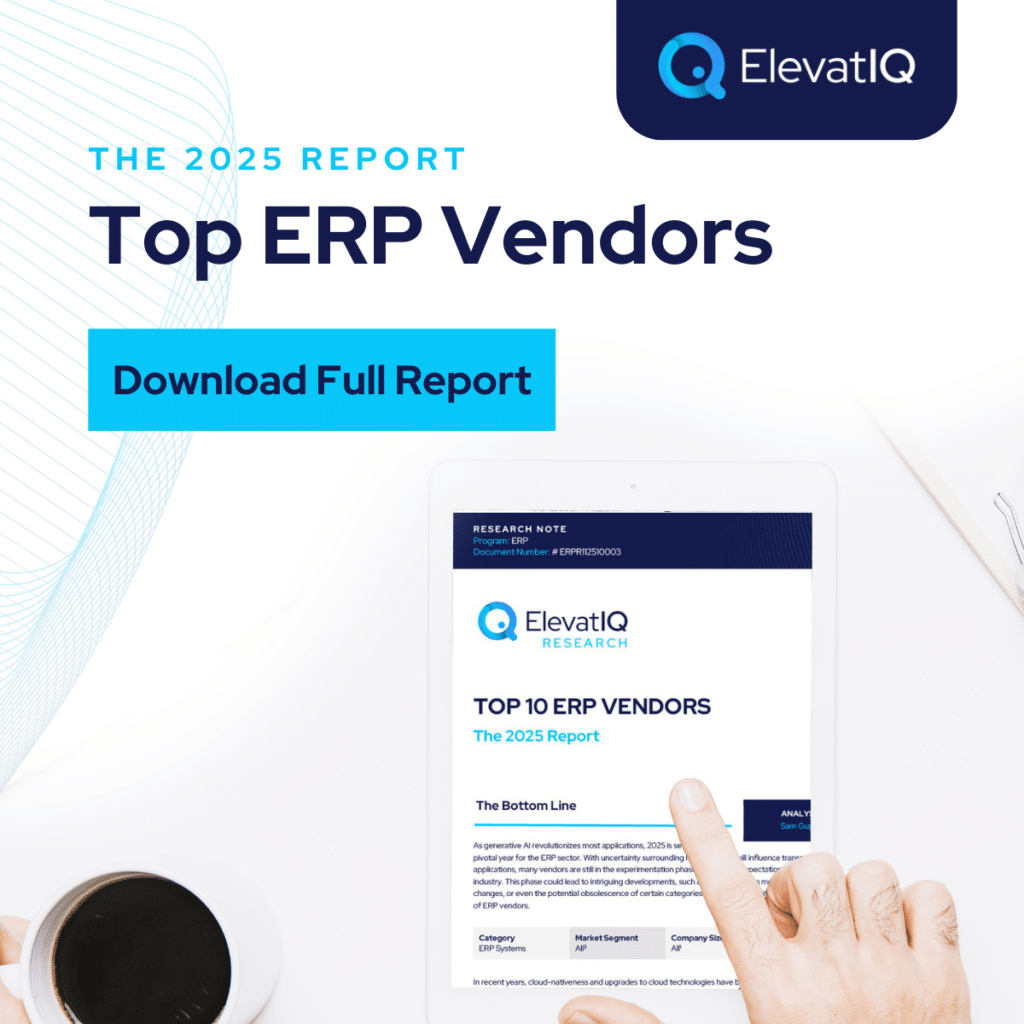
Critical ERP Contract Terms Every Buyer Must Negotiate
While pricing captures most buyer attention during ERP contract negotiations, numerous other terms significantly impact total cost of ownership and operational flexibility over the contract lifecycle.
ERP Software Licensing Structure and User Rights
Licensing models fundamentally determine ongoing costs and operational flexibility. The choice between named user and concurrent user licensing can create hundreds of thousands of dollars in cost variance for mid-sized organizations.
Named user licenses assign access to specific individuals, regardless of actual system usage. Concurrent user licenses allow a defined number of simultaneous users from a larger population. Organizations with many occasional users typically achieve better economics with concurrent licensing, though vendors often push named user models that generate higher revenue.
Critical licensing terms to negotiate include:
- User definition clarity: Precisely define what constitutes a user to prevent future disputes and expansion charges
- Transfer rights: Ensure you can reassign licenses between employees without additional fees
- Growth volume discounts: Lock in tier pricing for future user additions
- Development and testing environments: Clarify whether non-production environments require separate licensing
Maintenance and Support Agreement Negotiation
Annual maintenance fees typically start at 18-22% of license value and represent the vendor’s primary profit center. Without negotiated protection, these fees can increase 3-8% annually, compounding over time to dramatically inflate total cost of ownership.
Negotiate specific caps on annual maintenance increases, ideally tied to established indices like CPI. Secure multi-year pricing commitments that prevent arbitrary escalation. Additionally, ensure maintenance agreements include clear service level agreements with meaningful remedies for vendor failures to meet response time commitments.
Implementation Contract Terms and Scope Management
ERP implementation represents where initial budgets most frequently expand through scope creep and change orders. Thorough negotiation of implementation terms protects against uncontrolled cost escalation.
Demand detailed scope documentation that clearly defines:
- Specific deliverables with acceptance criteria
- Project milestones with completion dates
- Change order procedures with pricing methodologies
- Resource qualifications and assignment commitments
- Knowledge transfer and training deliverables
Fixed-price implementation contracts transfer risk to vendors but require extremely precise scope definition. Time and materials arrangements provide flexibility but need robust change control procedures and spending caps to prevent budget overruns.
Exit Clauses and Data Portability Rights
Organizations must protect their ability to change vendors or bring operations in-house without prohibitive barriers. Comprehensive exit provisions ensure you retain control over your data and business processes.
Essential exit terms include:
- Data ownership confirmation: Explicitly state that all operational data remains your property
- Export capabilities: Require standard format data exports within defined timeframes
- Transition assistance: Define vendor obligations to support migration to alternative systems
- Source code escrow: For business-critical systems, ensure access to source code if vendor operations cease
Price Protection and Future Cost Controls
Negotiations should address not just current costs but future pricing for additional modules, users, and services. Lock in pricing for anticipated expansion to prevent vendors from leveraging your dependency during future growth.
Secure commitments for:
- Protection against retroactive license true-ups
- Most-favored-customer pricing on future purchases
- Defined pricing for specific modules you may add later
- Volume discount tiers that apply automatically as you grow
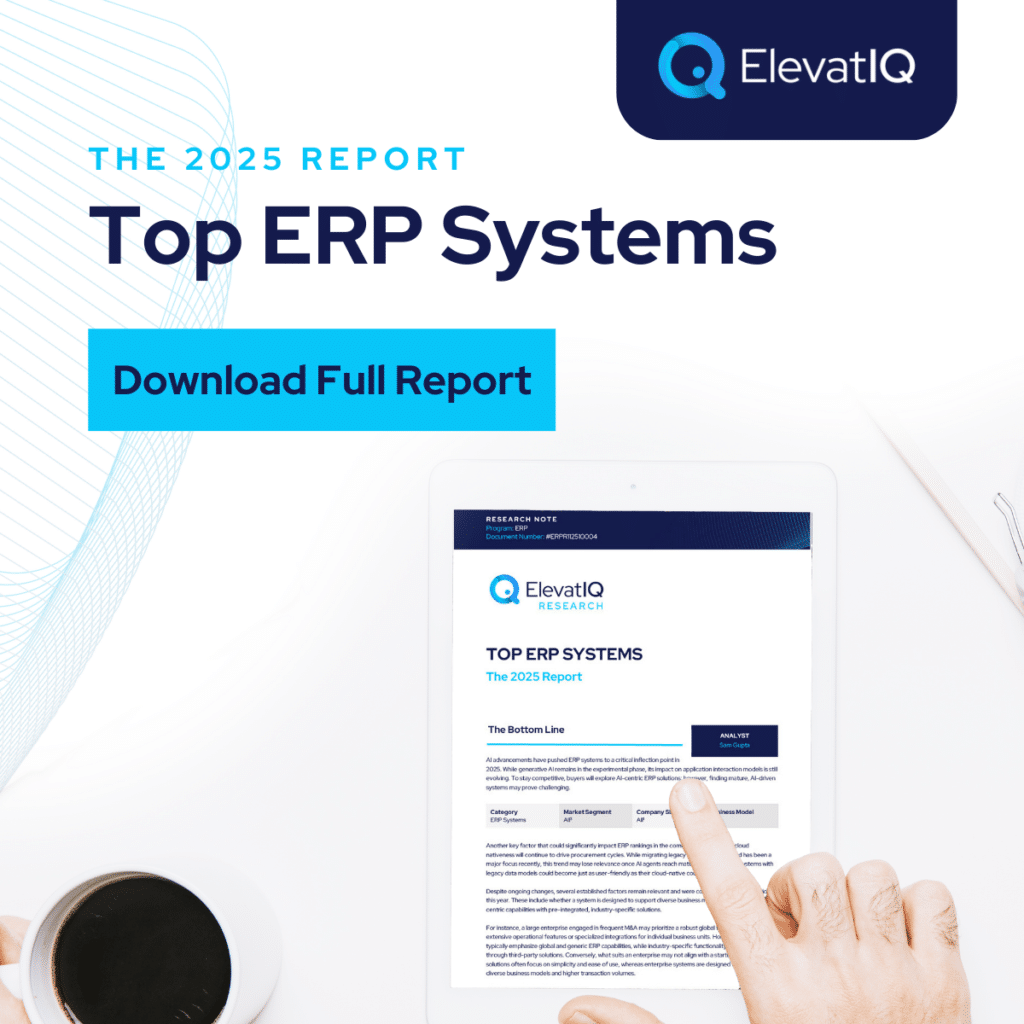
Strategic Timing: When to Negotiate ERP Contracts for Maximum Leverage
Timing significantly influences negotiation outcomes in enterprise software procurement. Understanding vendor motivations and fiscal pressures allows buyers to maximize leverage.
Quarter-End and Year-End Negotiation Tactics
Enterprise software vendors typically operate on calendar fiscal years with quarterly bookings targets. Sales representatives and their management chains face intense pressure during the final weeks of each quarter, with pressure multiplying at year-end.
Organizations can leverage this dynamic by structuring procurement timelines to reach final negotiations during these high-pressure periods. However, this strategy requires beginning evaluation and vendor selection processes months earlier to reach genuine purchase readiness when timing creates maximum advantage. Avoid artificial deadline manipulation that vendors recognize as tactical positioning. Instead, align legitimate procurement timelines with vendor fiscal calendars when possible.
Using Competitive Alternatives as Leverage
Credible competitive alternatives represent the most powerful negotiation leverage available to buyers. Vendors make significantly more aggressive offers when facing genuine risk of losing opportunities to competitors.
Conducting parallel evaluations of multiple vendors creates natural competitive pressure. However, this approach requires substantial organizational effort and should focus on genuinely viable alternatives rather than including vendors you have no intention of selecting. Independent ERP selection consultants help organizations efficiently manage competitive processes while maintaining vendor engagement and leverage throughout negotiations.
Common ERP Contract Pitfalls Buyers Must Avoid
Even experienced procurement teams encounter contractual traps that create future problems and unexpected costs. Understanding common pitfalls allows buyers to proactively address them during negotiations.
Vague Implementation Scope Definitions
Ambiguous scope language enables vendors to classify legitimate requirements as out-of-scope change orders. Every “reasonable efforts” or “best practices” reference in scope documentation represents a potential dispute and cost escalation.
Demand specific, measurable deliverables with clear acceptance criteria. If certain scope elements remain undefined during contracting, establish pricing methodologies and approval processes for addressing them rather than leaving terms entirely open.
Automatic Renewal and Price Escalation Clauses
Many enterprise software contracts include automatic renewal provisions with notification windows requiring 60-90 days advance notice to prevent renewal. Missing these deadlines locks organizations into additional contract terms, often with embedded price increases.
Negotiate explicit renewal processes requiring affirmative action from both parties. Ensure renewal terms cannot include price increases exceeding negotiated caps. Some organizations successfully negotiate declining pricing for renewal periods, reflecting reduced vendor acquisition costs.
Vendor Audit Rights That Favor the Seller
Compliance audit provisions often grant vendors broad rights to examine your systems and operations to verify licensing compliance. These audits frequently identify technical violations of complex licensing rules, generating significant unexpected costs.
Negotiate limitations on audit frequency, advance notice requirements, and dispute resolution procedures. Ensure audit rights are reciprocal, allowing you to verify vendor compliance with service level commitments and other contractual obligations.

The Role of Independent ERP Contract Advisors
Enterprise software contract negotiation requires specialized expertise that extends beyond general procurement capabilities. The complexity of licensing models, technical dependencies, and long-term operational implications demands focused domain knowledge.
How Independent Consultants Add Negotiation Leverage
Independent ERP advisors bring several advantages to contract negotiations. They maintain current visibility into market pricing across multiple vendors and industries, providing benchmark data that establishes realistic negotiation targets.
Their vendor neutrality allows more aggressive negotiation postures without damaging relationships organizations need to maintain post-implementation. Vendors recognize that experienced advisors understand their pricing flexibility and cannot be easily misled by artificial constraints.
Avoiding Conflicts of Interest in Contract Review
Implementation partners who also provide selection and contract advisory services face inherent conflicts of interest. Their ongoing relationships with software vendors may influence their negotiation advocacy, potentially disadvantaging buyers.
Organizations achieve optimal outcomes by engaging truly independent advisors without implementation practices that create mixed incentives. This separation ensures contract negotiations prioritize buyer interests exclusively.
Building Your ERP Contract Negotiation Strategy
Successful negotiations require structured preparation and coordinated execution across multiple organizational stakeholders.
Assembling Your Negotiation Team
Effective ERP contract negotiations engage expertise from procurement, IT, legal, finance, and business operations. Each function contributes essential perspectives:
- Procurement: Negotiation tactics and vendor management
- IT: Technical requirements and operational implications
- Legal: Contract structure and risk allocation
- Finance: Total cost of ownership modeling and budget authority
- Business operations: Functional requirements and process impacts
Designate a single negotiation lead with authority to make binding commitments, preventing vendors from playing stakeholders against each other.
Creating Competitive Tension Ethically
While competitive pressure improves outcomes, organizations must balance negotiation tactics with relationship integrity. Dishonest representations about competing offers or fabricated deadlines damage credibility and future vendor relationships.
Maintain genuine competitive processes with vendors you seriously consider. Share high-level information about competitive offers without breaching confidentiality or misrepresenting actual positions. Vendors respect honest competition more than transparent manipulation.
Setting Walk-Away Thresholds
Establish clear criteria that define unacceptable terms before beginning final negotiations. These thresholds might include maximum total cost, minimum required service levels, or essential contractual protections.
Communicating genuine walk-away positions to vendors demonstrates seriousness and often prompts previously unavailable concessions. However, organizations must be prepared to follow through, making this tactic effective only when alternative options genuinely exist.
Securing Fair ERP Contract Terms for Long-Term Success
ERP contract negotiations significantly impact not just immediate costs but operational flexibility and total ownership economics throughout the system lifecycle. Organizations that approach negotiations strategically, understand vendor dynamics, and focus on comprehensive terms rather than just price achieve substantially better outcomes.
The complexity of enterprise software contracts and the specialized knowledge required for effective negotiation make independent advisory support valuable for most organizations. Engaging experienced advisors who understand both contract structures and market dynamics helps ensure negotiations protect your interests while establishing productive vendor relationships.
Thorough contract negotiation represents one of the highest-return activities in enterprise software procurement, often delivering millions in savings and operational benefits that compound throughout the implementation and beyond.
For organizations navigating ERP selection and contract negotiations, enterprise software selection expertise provides the independent perspective and market knowledge that transforms procurement outcomes. The investment in proper negotiation support typically returns multiples through improved pricing, terms, and reduced long-term risk.
